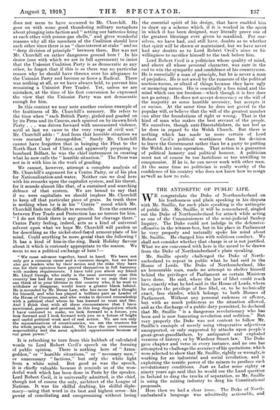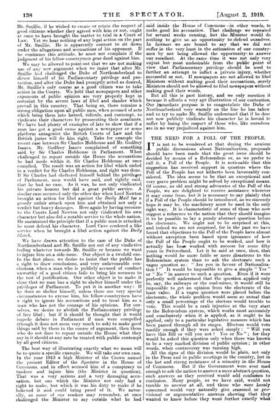THE ANTISEPTIC OF PUBLIC LIFE.
WE congratulate the Duke of Northumberland on his fearlessness and plain speaking in his dispute with Mr. Smillie, for such plain speaking is the antiseptic of public life. Mr. Smillie, it will be remembered, singled out the Duke of Northumberland for attack while acting as one of the Commissioners of the semi-judicial Sankey Inquiry. The Duke could not indulge in the defensive- offensive in the witness-box, but in his place in Parliament he very properly and naturally spoke his mind about Mr. Smillie. He charged him with seditious conduct. We shall not consider whether that charge is or is not justified. What we are concerned with here is the moral to be drawn from the Duke of Northumberland's plain speaking.
Mr. Smillie openly challenged the Duke of North- umberland to repeat in public what he had said in the House of Lords. The Duke of Northumberland, like an honourable man, made no attempt to shelter himself behind the privileges of Parliament as certain Ministers have done. He said, where the law of libel could reach him, exactly what he had said in the House of Lords, where he enjoys the privilege of free libel, or, to be technically exact, free slander, which belongs to both Houses of Parliament. Without any personal rudeness or offence,. but with as much politeness as the situation allowed, and as the discharge of a public duty permitted, he declared that Mr. Smillie " is a dangerous revolutionary who has been and is now fomenting revolution and sedition." But very properly the Duke was not content to follow Mr. Smillie's example of merely using vituperative adjectives unsupported, or only supported by attacks upon people's great-great-grandfathers, by antiquated and exploded versions of history, or by Wardour Street law. The Duke gave chapter and verse in every instance, and no one has attempted to challenge the accuracy of his quotations, which were selected to show that Mr. Smillie, rightly or wrongly, is working for an industrial and social revolution, and is exploiting the terrific power of the miners to produce such revolutionary conditions. Just as Lalor some eighty. or ninety years ago said that he would use the Land question in Ireland to drag the trucks of separation, so Mr. Smillie is using the mining industry to drag his Constitutional proposals. Here then we had a clear issue. The Duke of North- umberland's language was admittedly actionable, and .Mr..Staillie, if he wished to create or retain the respect of ..good citizens. whether, they agreed with hita fyr not- ought at once to have brought the matter to trial in a Court of Law. .Yet we hear nothing of any legal action en pie part of Mr. Smillie. He is apparently content to sit down under the allegations: and accusations of his opponent. If he continues this attitude, he must not complain if the judgment of his fellow-countrymen goes dead against him. We may be allowed to point out that we are not making use of any new Argument when we insist that after Mr. Siuillie had challenged the Duke .of Northumberland to divest himself of his Parliamentary privilege and pro- tection, And after the Duke JIM. promptly Acted as desired, Mr. Smillie's only course As a good citizen was to ,take Action in the Courts. We hold that newspapers .and other exponents of public opinion are very properly kept in restraint by the severe laws of libel And slander which prevail in this country. That being so, there remains a strong obligation-upon all public men, when accused of acts which bring them into hatred, ridicule, and contempt, to vindicate their characters by prosecuting their Assailants. We have had plenty of examples of late to show that if a man has .get a good cause against a newspaper or some platform antagonist the British Courts of Law and the British, juries will do him. right. Take for example the recent case between $ir Charles Hobhouse and Mr. Godfrey' Isaacs. Mr. Godfrey , Isaacs complained of something said. by Sir Charles Hobhouse in Parliament. When challenged to repeat outside the House the accusations he had made wit-bin it, Sir Charles Holshouse at once complied. The result was an action for libel which ended in .a verdict for Sir Charles Hobhouse, And right was done. If Sir Charles had sheltered himself behind the privileges of Parliament, men would have said, and rightly said, that he had no case. As it was, he not only vindicated his private honour but did a great public service. A similar case occurred only the other day when Lord Newton brought an action for libel against the Daily Mail for .:a grossly unfair attack upon him and obtained not only a verdict but heavy damages. Here again by having recourse to the Courts.Lord Newton not only vindicated his own character but also did a notable service to the whole nation. He maintained the principle that if a public man is attacked he must defend his character. Lord Cave rendered a like service when he brought a libel action against the Daily Sketch.
We have drawn attention to the case of the Duke of Northumberland and Mr. Smillie not out of any vindictive feeling whatever towards Mr. -8millie or because we want to injure him ona side-issue. Our object is a twofold one. In the first place, we desire to insist that the public has a right to draw conclusions, and very unfavourable con- clusions, when a man who is publicly accused of conduct unworthy of a good citizen fails to bring his accusers to the test of justification. Our other object is to make it clear that no man has a right to shelter himself under the privileges of Parliament. To put it in another way : If he 'does so shelter himself, unless there are very special circumstances to excuse him, his fellow-countrymen have a right to ignore his accusations and to treat him as a man who has not the courage of his opinions. For our- selves, we desire to abolish the Parliamentary privilege of free libel ; but if it should be thought that it would impede debate in Parliament if men were compelled (though it does not seem very much to ask) to make good things said by them in the course of argument, then those who do not dare to repeat outside the House what they say in it should at any rate be treated with public contempt by all good citizens.
The best way of illustrating exactly what we mean will be to quote a specific example. We will take our own case. In the year 1913 a high Minister of the Crown named the present Editor of the Spectator in the House of Commons, and in effect accused him of a conspiracy to traduce and injure him (the Minister in question). That was a very serious and a very damaging accu- sation, but one which the Minister not only had a right to make, but which it was his duty to make if he believed it and could bring proof of it. We natur- ally, as some of our readers may remember, at once challenged the Minister to say outside what he had said inside the House of Commons—in other worelo, to make, good ' his accusation. That challenge we repeated for several weeks running, but the Minister -would do nothing to :give us. an opportunity to defend ourselves. In fairness we Are bound to say that •we did not suffer in the very least in the .estiniation of our country- men by not being allowed the opportunity- answer our assailant. At the same time it was not only very unjust but most undesirable from the puhlic point of new that .Parliamentary privilege should be used to further an Attempt ,to inflict .a private injury, -whether successful or not. If newspapers are not allowed to libel Ministers without making good their accusations, :surely Ministers should, not be allowed to libel newspapers without making good their words. But all this is past history, and we only mention it because it affords a very apt illustration °tour contention, Our immediate purpose is to congratulate the Duke Northumberland very warmly on the line he has taken and to try to make ,Mr. Smillie understand that, if he doet not now publicly vindicate his character he is bound to suffer by losing the respect of those who, like ourselves, are in no way prejudiced. against him.



































 Previous page
Previous page